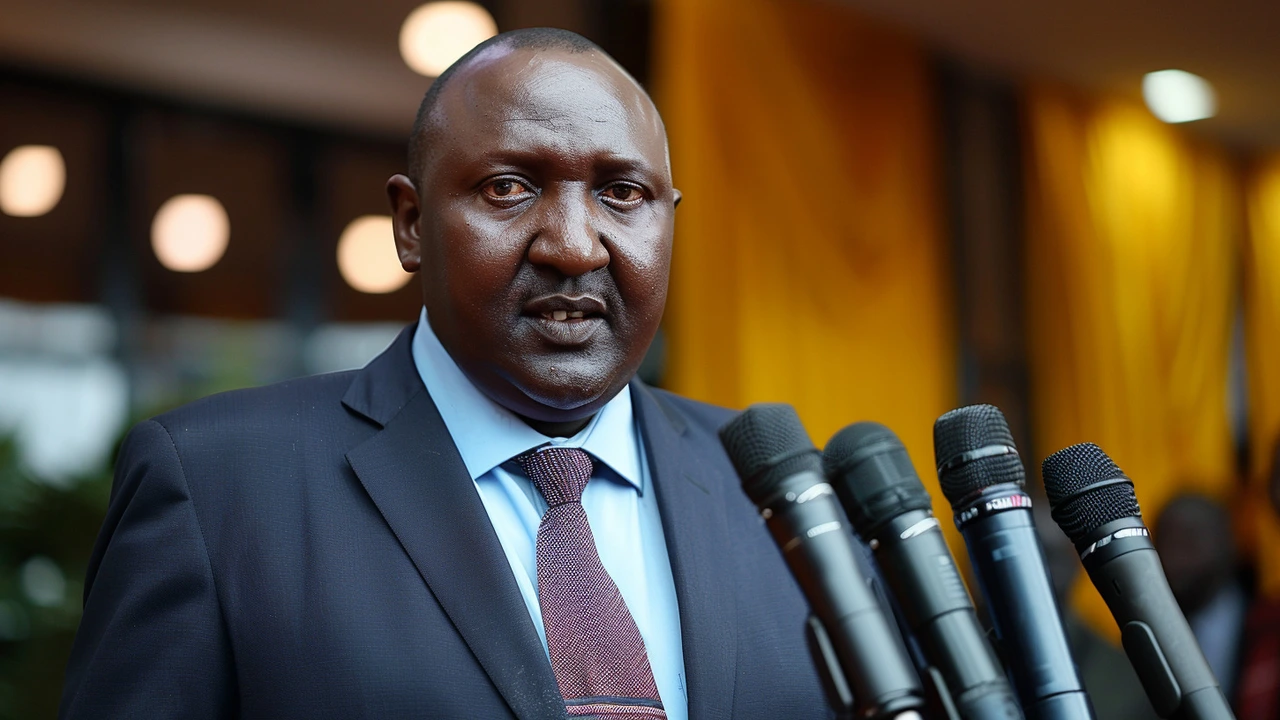Flood Disaster Puts Brakes on Educational Activities in Kenya
In an unexpected yet essential move, Kenya's President Williams Ruto has declared an indefinite postponement of the resumption of school activities across the nation. This decision comes as the country grapples with severe flooding, which has seen dozens of schools severely affected, with infrastructure crumbling under the weight of relentless rains. These floods have claimed the lives of over 180 people in just six weeks, highlighting a period of unexpected natural disaster.
The Extent of Damage
The heavy rainfall, which has continued unabated for several weeks, has overwhelmed many regions, particularly rural and underserved communities. The deluge has led to schools being submerged or severely damaged, making them unsafe for students and teachers. Essential amenities such as water, electricity, and roads have been compromised, further delaying any potential plans for normalcy in the educational sector.
Government's Response to the Crisis
In response to the ongoing crisis, President Ruto has taken a firm stance on prioritizing the safety and welfare of students and faculty by halting the educational calendar. This precautionary measure aims to allow ample time for recovery and rebuilding efforts. The Ministry of Education, under the directive of the government, has been tasked with developing a robust plan to manage the crisis, including the assessment of the structural integrity of schools and other educational facilities.
Furthermore, this pause in educational activities grants authorities the time to ensure that once schools reopen, they can provide a safe and conducive environment for learning. The government is also focusing on enhancing disaster readiness and response mechanisms to better predict and mitigate the effects of similar incidents in the future.
Impact on Education and Future Concerns
The indefinite closure of schools poses significant challenges, particularly in terms of continuity of education. Many students in Kenya rely heavily on school structures not just for education but also for essential services such as meals and mental health support. The disruption caused by the floods is likely to have long-term effects on the educational achievement and psychological well-being of children across the country.
Education officials and stakeholders are currently exploring alternative methods of instruction, including remote learning solutions. However, the digital divide and lack of infrastructure in many parts of Kenya pose substantial barriers to implementing comprehensive online education.
Community and International Support
The Kenyan government is actively seeking support from international donors and humanitarian organizations to aid in the relief efforts. Supplies, funding, and expertise are critically needed to rebuild schools and other essential infrastructure. Community efforts are also in full swing, with local groups mobilizing to support displaced families and help in the clean-up efforts.
Looking Ahead: A Resilient Future
As Kenya faces one of its most challenging times, the spirit of resilience and community shines through. The government's decision to prioritize safety over the haste to resume education underscores a commitment to cautious and structured recovery. With ongoing efforts and support, there is hope that Kenya will not only recover but also implement stronger measures to handle future calamities. The development of a resilient educational framework that can withstand the challenges posed by natural disasters is now more crucial than ever.
This crisis also serves as a reminder of the impact of climate change and the urgent need for countries, particularly those vulnerable to extreme weather conditions, to adopt and reinforce strategies that address these evolving environmental challenges.








WILL WILLIAMS
May 4, 2024 AT 01:24 AMWow, Kenya's schools are literally underwater-talk about a splashy disruption!
Barry Hall
May 14, 2024 AT 13:24 PMAppreciate the authorities stepping up. Stay safe everyone! :)
abi rama
May 25, 2024 AT 01:24 AMSeeing the community rally to rebuild gives hope that kids will get back to learning soon.
Megan Riley
June 4, 2024 AT 13:24 PMThe flood crisis in Kenya is a heartbreaking reminder of how vulnerable our education systems can be when Mother Nature decides to turn up the volume.
First and foremost, my heart goes out to every child who has lost the safety of a classroom and the comfort of a school meal.
We must remember that schools are more than just walls and desks; they are lifelines, offering shelter, nourishment, and even a sense of normalcy.
The government's decision to pause school operations, while painful, is undeniably the right move to protect lives.
Rushing back into damaged buildings could lead to tragic accidents, and no academic calendar is worth a child's safety.
Communities across the nation have already begun to organize clean‑up crews, demonstrating the power of collective action.
International donors are stepping in with essential supplies-water purifiers, temporary shelters, and educational kits-to bridge the immediate gap.
Moreover, this pause presents an unprecedented opportunity to rethink how we deliver education in disaster‑prone regions.
Investing in resilient infrastructure, like flood‑proof classrooms and solar‑powered learning hubs, will pay dividends for generations.
Remote learning platforms, though hampered by the digital divide, can be bolstered with satellite internet and community radio lessons.
Teachers should receive training on psychosocial support so they can help students process the trauma they have endured.
Parents, too, need resources to create safe learnign spaces at home, even if it's just a quiet corner with a borrowed textbook.
This crisis also shines a light on the urgent need for climate‑change mitigation policies, because extreme weather events are only going to get worse.
Every stakeholder-from government officials to private NGOs-must coordinate their efforts to ensure no child falls through the cracks.
In the end, the resilience we build today will become the foundation of a stronger, more adaptable Kenya tomorrow!
Lester Focke
June 15, 2024 AT 01:24 AMOne must consider the epistemological ramifications of halting pedagogical processes in the face of hydro‑meteorological calamities; the cessation is, in fact, a tacit acknowledgment of infrastructural fragility.
Naveen Kumar Lokanatha
June 25, 2024 AT 13:24 PMI agree the pause shows the schools need a revamp its not just about water damage the whole system feels the strain
Alastair Moreton
July 6, 2024 AT 01:24 AMAnother bureaucratic nightmare, just what we needed.
Surya Shrestha
July 16, 2024 AT 13:24 PMIndeed, the administrative response appears to be a masterclass in indecisiveness; however, one might argue that the very deliberation reflects a commendable caution.
Rahul kumar
July 27, 2024 AT 01:24 AMQuick tip: set up temporary tents with waterproof flooring and use solar chargers for tablets-works great even in flood zones.
mary oconnell
August 6, 2024 AT 13:24 PMWhile deploying ad‑hoc shelters is a pragmatic stopgap, one must interrogate the ontological underpinnings of 'temporary' in disaster pedagogy-such ephemeral solutions often mask systemic neglect.
Michael Laffitte
August 17, 2024 AT 01:24 AMCan you imagine kids trying to study with water up to their knees? It's like a scene from a dystopian movie!
sahil jain
August 27, 2024 AT 13:24 PMTotally wild! 😱 The sheer chaos is unreal but the resilience shines through!
Bruce Moncrieff
September 7, 2024 AT 01:24 AMI wonder how the curriculum will adapt-maybe we’ll see flood‑science modules become mandatory!
Dee Boyd
September 17, 2024 AT 13:24 PMSuch a push toward interdisciplinary curricula is a veneer of progress; the underlying agenda often serves neoliberal metrics rather than genuine educational enrichment.
Carol Wild
September 28, 2024 AT 01:24 AMOne cannot help but notice the almost orchestrated nature of the media narrative surrounding the Kenyan floods; every headline seems to echo a script designed to funnel international aid through predetermined channels, thereby reinforcing a shadowy network of geopolitical influence.
The timing of the school closures, announced just as several donor agencies were convening in Nairobi, raises eyebrows about the symbiotic relationship between disaster response and fiscal appeasement.
Moreover, the emphasis on 'climate change' feels like a convenient smokescreen, diverting attention from the entrenched corruption that has left critical infrastructure in perpetual disrepair.
It is plausible to surmise that certain elite factions benefit from the prolonged reconstruction contracts, ensuring a continuous flow of capital into their coffers.
While the humanitarian plight is undeniably real, the optics are meticulously curated to serve broader strategic interests.
Therefore, a skeptical eye is warranted when assessing the proclaimed altruism of the involved parties.
In summation, the flood crisis may be less about nature’s fury and more about human machinations.